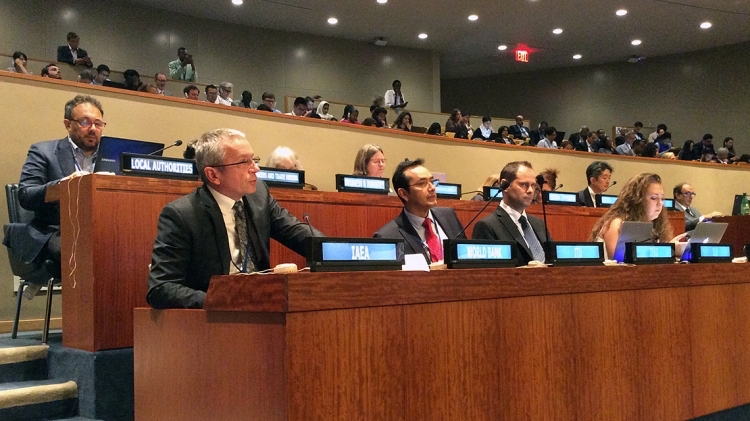
By Santo D. Banerjee
NEW YORK (IDN) – At the High-Level Political Forum (HLPF) on Sustainable Development, concluding on July 18 in New York, the International Atomic Energy Agency (IAEA) has highlighted its contributions to promoting the Sustainable Development Goals.
Capacity building to ‘ensure access to affordable, reliable, sustainable and modern energy for all’ as envisaged by SDG 7 was the focus of a training course organized by the IAEA, the world’s central intergovernmental forum for scientific and technical cooperation in the nuclear field.
At side events, the IAEA, described as the United Nations nuclear watchdog, also stressed its contributions to promoting SDG 6 calling for clean water and sanitation for all people, SDG 11 aiming to make cities inclusive, safe, resilient and sustainable, and SDG 15 devoted to sustainable management of forests, combating desertification, halting and reversing land degradation, and stopping biodiversity loss.
According to Jennet Orayeva from the IAEA Department of Nuclear Energy and Miklos Gaspar from the IAEA Office of Public Information and Communication, the training course entitled “What is needed to make capacity building for SDG 7 truly effective?” included presentations of key elements of the IAEA’s capacity building framework for energy planning that integrate the complex challenges associated with the sustainable development goals.
The IAEA instructors shared the IAEA’s experience of over six decades in capacity building for development of sustainable energy strategies. The training session allowed participants to understand the key elements of an effective capacity building programme as well as the use and relevance of model-based scenario analysis for evidence based decision-making, reported Orayeva and Gaspar.
“Energy is central to the achievement of both the 2030 Agenda for Sustainable Development and the Paris Agreement on Climate Change,” said Xolisa Mabhongo, Representative of the IAEA Director General to the UN and Director of the IAEA New York Office, who leads the IAEA delegation at the Forum.
“SDG 7 is directly linked to many other SDGs, including poverty eradication, gender equality, mitigation of and adaptation to climate change, food security, health, clean water and sanitation,” he said. “Therefore, the achievement of the Goal 7 will have many positive outcomes for humanity.”
Effective implementation of Agenda 2030 and the SDGs will require access to knowledge and information, not only for policy makers and leaders to design well-informed and effective policies and strategies, but also for committed and engaged individuals around the world.
Key areas of the IAEA’s capacity building programme include:
- Energy models development and transfer.
- Training and technical assistance.
- Energy-Economic-Environmental (3E) analyses.
- Topical studies on sustainable development and climate change.
Addressing the session on SDG 6, which calls for clean water and sanitation for all people, Martin Krause, Director at the IAEA’s Department of Technical Cooperation pointed out that isotopic techniques make an important contribution to water management, enabling scientists to determine the source, age, movement and interaction of water above and below ground.
This research allows experts to determine replenishments rates for groundwater and assess the vulnerability of groundwater to pollution, he said, pointing out that 71 ongoing technical cooperation projects and four coordinated research projects deal with water.
At the session focusing on SDG 11, aiming to “make cities inclusive, safe, resilient and sustainable”, Krause said, nuclear techniques make a contribution to the sustainability of cities and their communities.
“In the areas of energy, water, sanitation, waste management and air pollution nuclear technologies provide solutions to cities,” he said, pointing to Indonesia’s example on combatting air pollution in its major urban areas based on measurements using nuclear techniques.
“Sustainable management of agricultural land and water is fundamental to global food security, especially in the face of climate change and increasingly variable weather conditions,” he said, at the forum on SDG 15.
He added, “using nuclear technologies, IAEA supports the development of sustainable land and water management practices that contribute to increasing global agricultural production and food security, while conserving natural resources.” The IAEA counts over 200 projects in the area of food and agriculture, many of them jointly implemented with the FAO.
At the plenary session on advancing science, technology and innovation in support of the SDGs, Krause talked of the role of nuclear science and technology for development.
“Governments and citizens around the world are reaping the benefits of nuclear science and technology in fields as diverse as agriculture, health, industry, energy, water management and environmental monitoring,” he said. “We pledge to contribute to resolving development drawing on our unique expertise in science and technology,” he added. [IDN-InDepthNews – 13 July 2018]
Photo: Martin Krause, Director of the Division of Programme Support and Coordination, IAEA Department of Technical Cooperation, attends the UN event on sustainable development in New York. Credit: D. Shropshire/IAEA.
IDN is flagship agency of the International Press Syndicate.
facebook.com/IDN.GoingDeeper – twitter.com/InDepthNews











